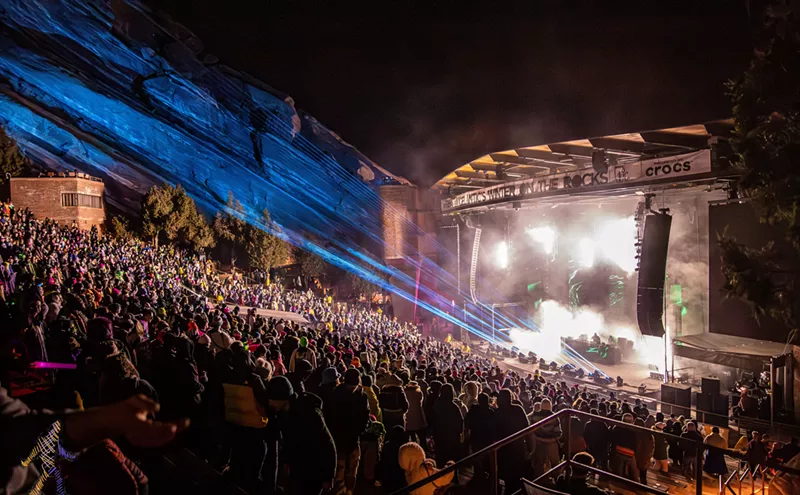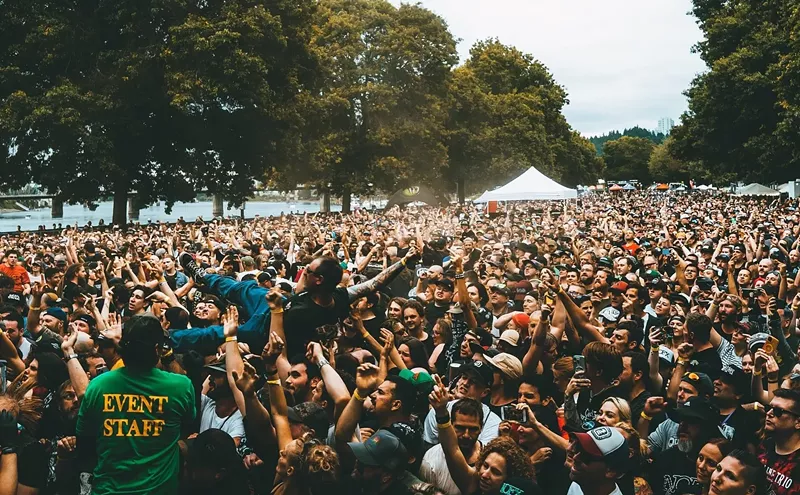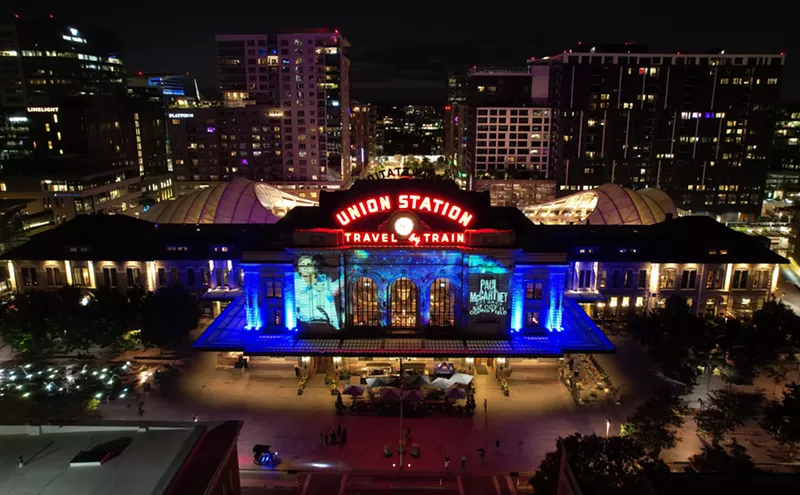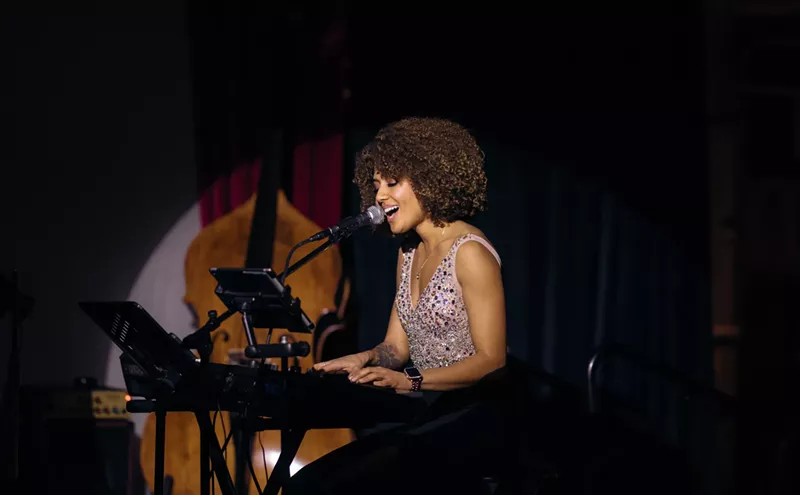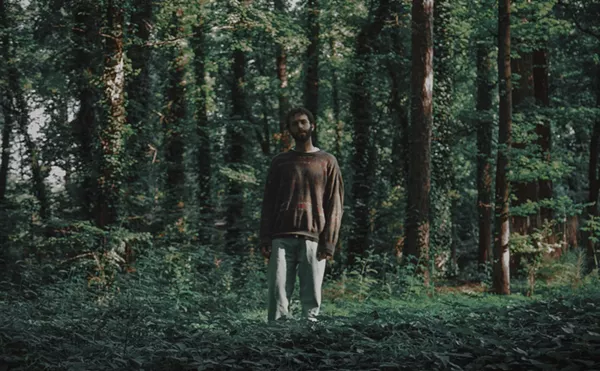A few years after being formed by Rozz Williams in 1979, Christian Death released Only Theater of Pain, an album that's considered to be a classic of both death rock and post-punk. With its dark lyrics and themes, the group embodies the aesthetic and sound of gothic rock better than most other bands. Its unflinching expression of raw human emotion has always been imbued with an atmosphere and sensuality that elevated the music beyond that of its imitators.
See also: Tonight: Christian Death at the Oriental Theater, 10/1/13
The group's longest-running member, guitarist and vocalist Valor Kand, joined Christian Death after the split of his old band Pompeii 99 in 1983, and he added his gift for haunted yet sharp guitar work to the band's underrated second album, Catastrophe Ballet. In 1985, Williams left the band, but the remaining members decided to continue with lead-vocal duties being shared by Kand and his ex-Pompeii 99 bandmate Gitane Demone, who had joined Christian Death alongside him. With Kand at the helm, Christian Death has continued to this day.
Rumors of a lawsuit between Williams and Christian Death for the rights of the name were dispelled in an interview with our sister paper, the Dallas Observer, when Kand revealed that he and Williams came to an agreement whereby each singer could continue with his own lineup of the band, and each co-existed until Williams's suicide in 1998.
Singer and bassist Maitri joined Kand's Christian Death in 1992 and added her own flair with versatile and powerful vocals. These days, she and Kand perform as Christian Death with drummer Jason Frantz, who grew up in Boulder. We recently spoke with Kand about how the band's music isn't all dark, about how the group performs much of its classic music with the help of technology and about the act's plans to release a new album, titled The Root of All Evil, next year.
Westword: What got you started playing rock music?
Valor Kand: I like pop culture, I guess, so it was quite a natural thing for me.
Was there a musician or type of music that inspired you to pick up a guitar?
No, I just like instruments. I started out as a drummer, but I think the problem with drums is that you can bang and you can boom, but it's hard to create a tune. So I had to progress to other instruments as time went by just to create the sounds I wanted to hear, whether that be keyboards, or horns, or guitars, or anything I could put my hands on.
Was Pompeii 99 your first band?
Pretty much, yeah. I started that band in L.A.
Did you move to L.A. from elsewhere, or did you grow up there?
No, I've got family in a lot of different places. I lived with my dad and my grandmother and my aunts and stuff like that. I lived in Australia, England and in Europe in several different places. I'm actually, what I consider, from "Abitsa" -- a bits of this and a bits of that.
Pompeii 99 was around in the early '80s. Was L.A. different then than it is now in terms of getting involved in playing live music?
I don't think it was any different than it is now. There was the pay-to-play going on then, too, pretty much. If you were going to play someplace like the Troubadour and you were a nobody band, you had to hire their P.A., which is kind of like a scam on the pay-to-play thing. All that stuff, the pay-to-play thing, started in L.A. anyway.
All of the clubs were owned a lot by the same people, and they knew there were a lot of artists out there that would be willing to do anything, and they took advantage of that. We were amongst that. It wasn't until we started getting radio play and mentions in the L.A. Weekly and all that kind of stuff that we got our own crowd, and we got good paying gigs and good support slots, like opening for Public Image Limited and all that kind of stuff.
Presumably you saw Christian Death before you joined. What was your impression of them?
There was the alternative scene in L.A., and there was the metal scene. I wasn't into all the hair stuff. But I liked all the bands that were alternative. I was interested in everything. Christian Death was just a darker version of the punk scene, pretty much. What we were doing was in a similar direction. It was a natural thing for us to hook up and do some shows together.
Then, when the band split up, we had already met Rozz [Williams], and at that point he said, "How would you like to join our band?" It added another dimension to involve him in what we were already doing, because we had four vocals and harmonies alongside the instrumentation. We just thought it would be a good angle to have so much vocal stuff going on -- and variety. He was also into the same kind of art. So it was a meeting of like minds.
For your live shows these days, do you perform songs from across a broad spectrum of the band's career?
We try to. We try to do a spectrum of all the stuff from the various records. Sometimes we have a period we're trying to convey, and certain songs just seem to work better with others. We can't play something from every album. Even if we did one song off of every project, our show would be two hours long. So we basically try to convey a feeling that depends on the direction and subject matter of the mood we're trying to set. So finding material that is compatible is usually our objective.
Some people have a misconception, because of the band's name or because of a song they heard, and they assume that all your songs are like that, that your music is just dark and brooding, but on your 2007 album American Inquisition, a song like "To Disappear" seems more of an emotional catharsis that you could hear in any rock song if the emotions weren't watered down. Do you feel your music might come from more of that kind of core rather than something more conceptual?
We consider the world our palette, and all the different sounds, emotions, topics and subjects [are part of that]. American Inquisition was the first critical offering we've ever done. Everything else had individual songs that were of a socio-political nature. But American Inquisition was the first album that was geared toward that because of what was going on in the Bush administration.
Sometimes we're dark, sometimes we're very poppy -- it just depends on what we're trying to express. If the lyrical nature is supposed to be dark, then we're going to portray a dark feeling. If it's meant to be something lighter, then that's how the music is. For example, we did the albums after Sex and Drugs and Jesus Christ, called All the Love All the Hate, in 1989.
One part was exclusively dark and one was exclusively light, and that was just to show the juxtaposition of society and humanity as it is. So we do play with those various feelings, because we're human beings and we have various emotions. It would be so boring if we were stuck in the same dirge all the time and being just dark.
For example, I couldn't write death-metal songs and be happy with that. I find it sad when people get pigeonholed and can't get out of it, and when they try to get out of it, their fans are horrified because that's all they want from them. We're fortunate for the fact that people have been able to appreciate the various aspects of our music. Of course, from time to time, there are people that wish we would stay one thing or the other, because that's the way some people are. But we're not going to be limited by that stigma of being one thing or the other.
The name Christian Death does have a connotation of being locked into whatever it symbolizes to some people, whether that be a dark thing or another. Everyone has their own perspective on how they perceive it. Today, when we were in Dallas waiting to fly to Denver, we met a family from the north of England, and they were very religious people.
They questioned us about the name of the band and straightaway thought it was a Christian band, but we said, "Not exactly." But they had their perspective of what it was, and we told them we are open to every religion. We're not specifically anything. We try to reflect the world as we see it around us. They didn't quite grasp it, but we tried.
You're not on anyone else's timeline as an artist, but do you have a new album in the works?
Yes we do. The Root of All Evil is the title, but we're not finished yet. As we evolve in the completion of it, you never know if we'll for sure retain the title. The plan is to have it out by spring time. Don't hold me down to that, though.
In writing your music, you cut yourselves off from outside influences, in terms of listening to new music or seeing movies and the like. Why do you feel that is important for you to do?
We try not to be influenced be anything because then you're not going to come up with something different. You're going to come up with something that inherently or vaguely maybe be connected with some bandwagon. The only way we can be true to ourselves is to let it come out of us as a pure art form. Technology already has a dramatic influence on us as it affects society. But we try not to consciously listen to other stuff and be influenced by it.
I don't like to watch movies too much or buy records. We hear stuff just because it's there because you can't avoid it but you always try to produce your own language to translate into an audio expression.
Is the way you create music an accumulation of ideas or is it more an intuitive process?
The most dominant aspect is the lyrics and then we try to translate the lyrics and the emotions we feel in the lyrics. Sometimes we just come up with a melody we like and put it aside until we think that maybe there's something lyrically that can express that emotion. We don't really have any rules. We let it play out how it comes out. Maitri definitely thinks it's a spontaneous process.
Do you incorporate costumes and that more theatrical element into your shows when you tour?
We are quite theatrical but it depends on the nature of our performance. If we're promoting an album obviously we're going to go along with the theme of that particular album. This tour we're not promoting a specific album though we are doing new songs that are on our upcoming album. For this tour we're going to play the songs that feel the best to us at this time.
We're a three piece, so the theatrics are kind of limited right now with that set-up. But we like the three-piece because we work together so well. So that, in itself, is a whole new perspective on performance than it used to be with four or five or six people on stage. We've had chamber orchestras before.
That's complicated and hard to pull off. It doesn't always work and it's not always fun to tour with that many people because you have to deal with all the emotions. Touring is a difficult thing, and you can only do it happily with people that can handle it, and who are easy to get along with and professional at the same time. We're very happy with the three-piece unit because we're very dear friends, and we perform tightly. The branches are interwoven.
Is the three piece more of a rock thing? Do you use sequencers or other electronics for the synth parts?
We do have sequences for all the things we need. So we have strings and keyboards in the sequencer. That works really well. Sometimes it's easier for me to be theatrical when I'm just a frontman and not playing guitar. It's a lot of work to play guitar and sing.
You don't use amps on tour, do you?
No, we're totally digital. We use PODs, and we also have like a ProTools type of set-up. It's actually Cubase, but we go directly through that in real time. Sometimes our guitar effects are programmed to come in on the sequence. In other words the compressors and stuff will kick in as we're going down the timeline. Pretty high tech.
So you don't have a pedal board?
I have that, too. Instead of several pedal boards I have one with my main sound and the sequence kicks in with extra delays and reverbs and stuff like that. I have the freedom to experiment with what I'm doing and embellishing the free form stuff we like to do, so we're not locked into what we're doing, and I have the freedom to express that in real time.
You're combining versatility with portability.
Exactly. We have a super high powered laptop which is just as powerful as what we use to record in the studio. We have the latest version of Cubase and we have the latest Focusrite Saffire box and it's latency free. We're not doing it, but we have the option to do this on the next tour.
We may do it when we go to South America, but we'll have an ADAT with us, so that we can actually have the drums going through Cubase, so that all the drums effects are pre-programmed and going directly out to the front of the house with all the effects, like the delays, perfectly in time.
This device we have only had for a couple of months and we haven't come to grips with handling that many tracks at once but we will be able to do that. At the same time we can record every show in real time as we're playing. It's super neat.
Follow @Westword_Music



